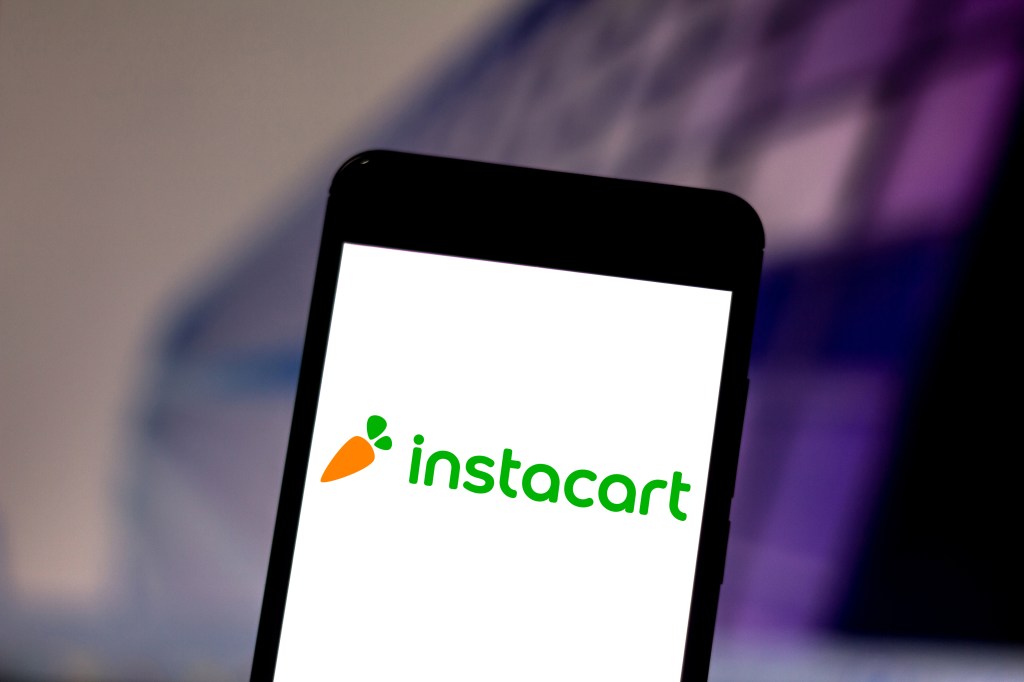Instacart dropped a new S-1 filing on Monday, indicating for the first time a proposed price range for its IPO. The company intends to sell shares in its debut for between $26 and $28 per share.
As 22 million shares will be sold in the company’s debut per its current plans, the company could sell as much as $616 million worth of its stock in its IPO. That pile of capital won’t all land in its corporate accounts, however, as just 14.1 million of the shares will come from Instacart itself, with another 7.9 million stemming from existing shareholders.
The Exchange explores startups, markets and money.
Read it every morning on TechCrunch+ or get The Exchange newsletter every Saturday.
There’s also a 3.3 million share underwriter option, a $175 million Series A redeemable convertible preferred stock with Pepsi in the mix, and more nuance when it comes to Instacart’s fully diluted share count.
 All that boils down to a simple IPO valuation range of $7.2 billion to $7.8 billion, and a fully diluted market cap potential of between $8.6 billion and $9.3 billion, by our calculation. Renaissance Capital itself ran the maths and found that at midpoint of its target IPO price range and using a fully diluted share count, Instacart is worth around $9.1 billion.
All that boils down to a simple IPO valuation range of $7.2 billion to $7.8 billion, and a fully diluted market cap potential of between $8.6 billion and $9.3 billion, by our calculation. Renaissance Capital itself ran the maths and found that at midpoint of its target IPO price range and using a fully diluted share count, Instacart is worth around $9.1 billion.
Now that we have some firm numbers to play with, let’s take a look at what those top-level metrics mean for the U.S. unicorn and erstwhile decacorn.
Is $9.3 billion a lot for Instacart?
Compared to its final private-market price set back in 2021, no. It’s around $30 billion down from that mark. But as every tech company of scale that we can bring to mind has taken a valuation cut since those heady days, it’s hardly worth dwelling on Instacart’s own discount.
What we care more about is how rich — or not — its new valuation is compared to its recent financial performance. Recall that in the wake of the pandemic bump to services like grocery delivery, Instacart managed to hold on to all its earned scale and has become comfortably profitable to boot.
Here are the Key Numbers For Our Purposes this morning, pulling from Instacart’s latest S-1/A filing:
- H1 2023 revenue: $1.48 billion
- H1 2023 revenue growth: 31%
- H1 2023 gross profit: $1.11 billion ($769 million in the year-ago period)
- H1 2023 gross margin: 75% (68% in the year-ago period)
- H1 2023 operating income: $269 million (–$73 million in year-ago period)
- H1 2023 net income (before “undistributed earnings attributable to preferred stockholders”): $242 million (–$74 million in the year-ago period)
Using Instacart’s H1 2023 revenue to create an annual run rate of $2.95 billion, we can infer that Instacart is targeting a revenue multiple of up to 3.2x. To make that number appear more extreme, we could compare the company’s annualized H1 revenue to the low end of its nondiluted market cap at the low end of its range, allowing us to push the number down to just 2.4x.
At the upper end of Instacart’s fully diluted market cap, we are getting a revenue multiple for the company of just over 3x, which feels very low. After all, Instacart is growing its revenues as quickly as many pure software companies, and it has similar gross margins. Apart from the fact that it is not a SaaS business, its top-line growth and quality do feel very familiar.
What doesn’t is the fact that Instacart makes money. If it seems odd that Instacart looks like a software company in many ways but is set to trade — provided it doesn’t raise its price range targets — at a 3x multiple despite making lots of profit, let me explain.
Here’s a helpful breakdown of how to define a software company:
- If it makes the majority of its revenue from selling software, it’s a software company.
- If it doesn’t, it isn’t.
Instacart fails this test, deriving lots of revenue from its grocery delivery business and its advertising efforts. Both are great! Both are not software.
I started this post expecting to argue that Instacart has put out a conservative first IPO price range so that it can raise it up. I still think that is likely to happen. But at the same time, Instacart’s core business efforts — while clearly valuable and lucrative — are macroeconomically sensitive in a way that software is not. Software revenues tend to grow over time; Instacart, in contrast, needs to keep consumers active so that its entire model keeps growing.
If consumer demand for its core service slows, the company’s ability to drive more revenue from that activity — say, in the form of advertisements — will also slow. In short, it is probably worth less per dollar of revenue than SaaS companies for the same reason that video game companies are worth less than SaaS concerns: Their revenues can go down.
Lots more to come on the IPO theme, like whether Instacart manages a higher price range, the latest from Klaviyo, and what we might expect other unicorns to take in terms of valuation haircuts.































Comment